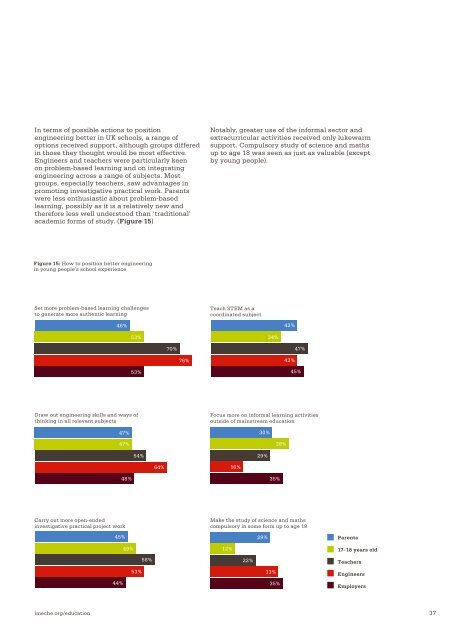BIG IDEAS THE FUTURE OF ENGINEERING IN SCHOOLS
10EyKv
10EyKv
Create successful ePaper yourself
Turn your PDF publications into a flip-book with our unique Google optimized e-Paper software.
In terms of possible actions to position<br />
engineering better in UK schools, a range of<br />
options received support, although groups differed<br />
in those they thought would be most effective.<br />
Engineers and teachers were particularly keen<br />
on problem-based learning and on integrating<br />
engineering across a range of subjects. Most<br />
groups, especially teachers, saw advantages in<br />
promoting investigative practical work. Parents<br />
were less enthusiastic about problem-based<br />
learning, possibly as it is a relatively new and<br />
therefore less well understood than ‘traditional’<br />
academic forms of study. (Figure 15)<br />
Notably, greater use of the informal sector and<br />
extracurricular activities received only lukewarm<br />
support. Compulsory study of science and maths<br />
up to age 18 was seen as just as valuable (except<br />
by young people).<br />
Ways of making engineering better<br />
position in young people’s schools<br />
Figure 15: How to position better engineering<br />
in young people’s school experience<br />
Set more problem-based learning challenges<br />
to generate more authentic learning<br />
Teach STEM as a<br />
coordinated subject<br />
46%<br />
42%<br />
53%<br />
34%<br />
70%<br />
47%<br />
76%<br />
42%<br />
53%<br />
45%<br />
Draw out engineering skills and ways of<br />
thinking in all relevant subjects<br />
47%<br />
47%<br />
54%<br />
Focus more on informal learning activities<br />
outside of mainstream education<br />
30%<br />
29%<br />
38%<br />
64%<br />
16%<br />
48%<br />
35%<br />
Carry out more open-ended<br />
investigative practical project work<br />
45%<br />
Make the study of science and maths<br />
compulsory in some form up to age 18<br />
29%<br />
Parents<br />
49%<br />
12%<br />
17–18 years old<br />
58%<br />
22%<br />
Teachers<br />
44%<br />
53%<br />
33%<br />
35%<br />
Engineers<br />
Employers<br />
imeche.org/education<br />
37


